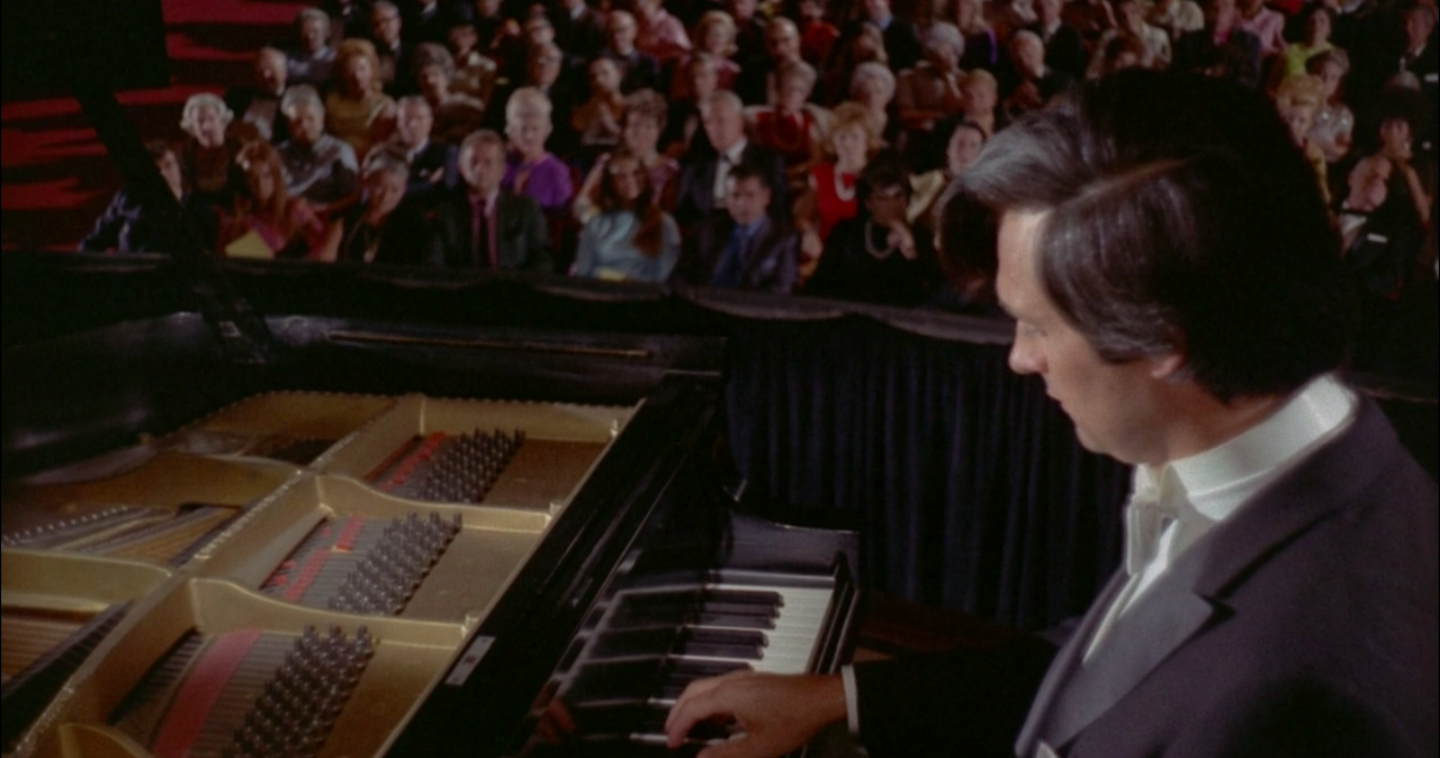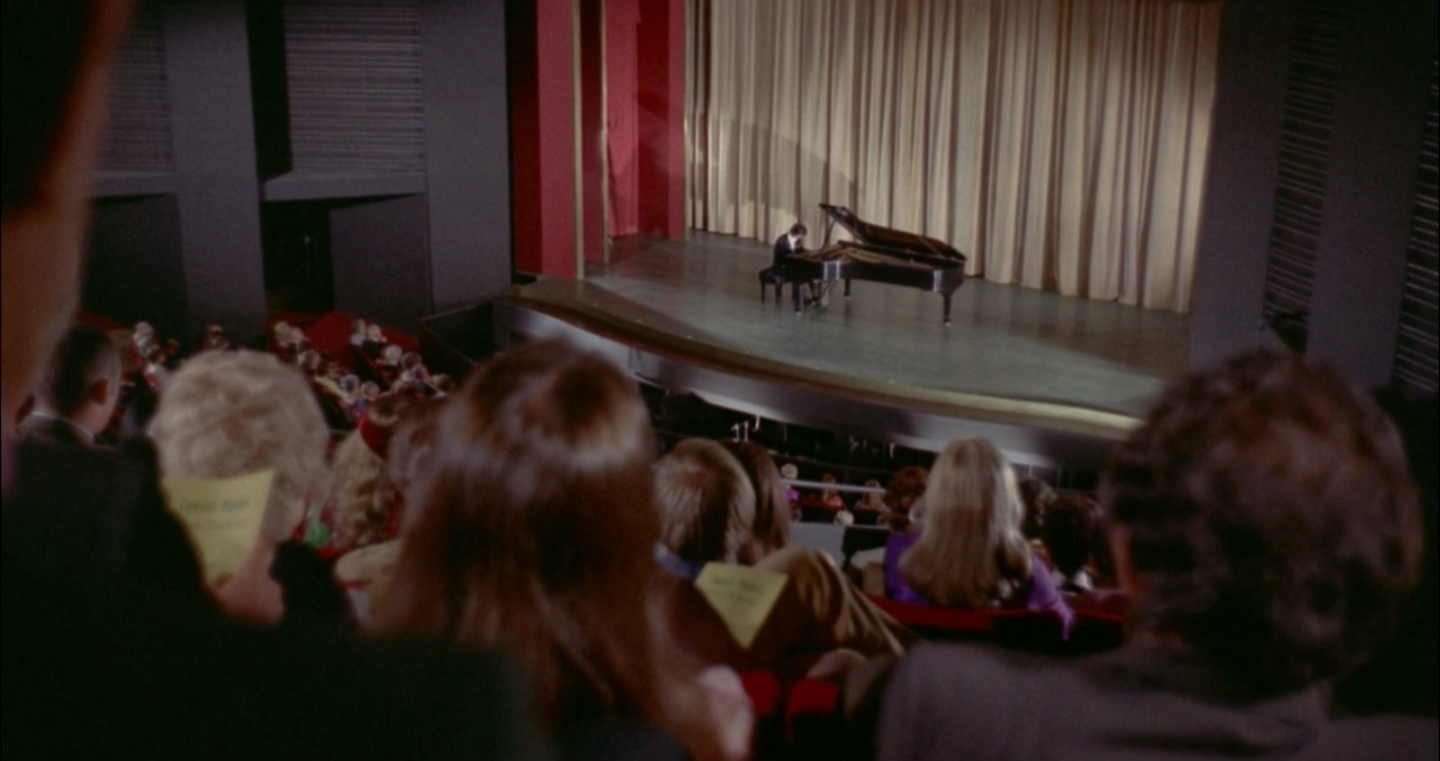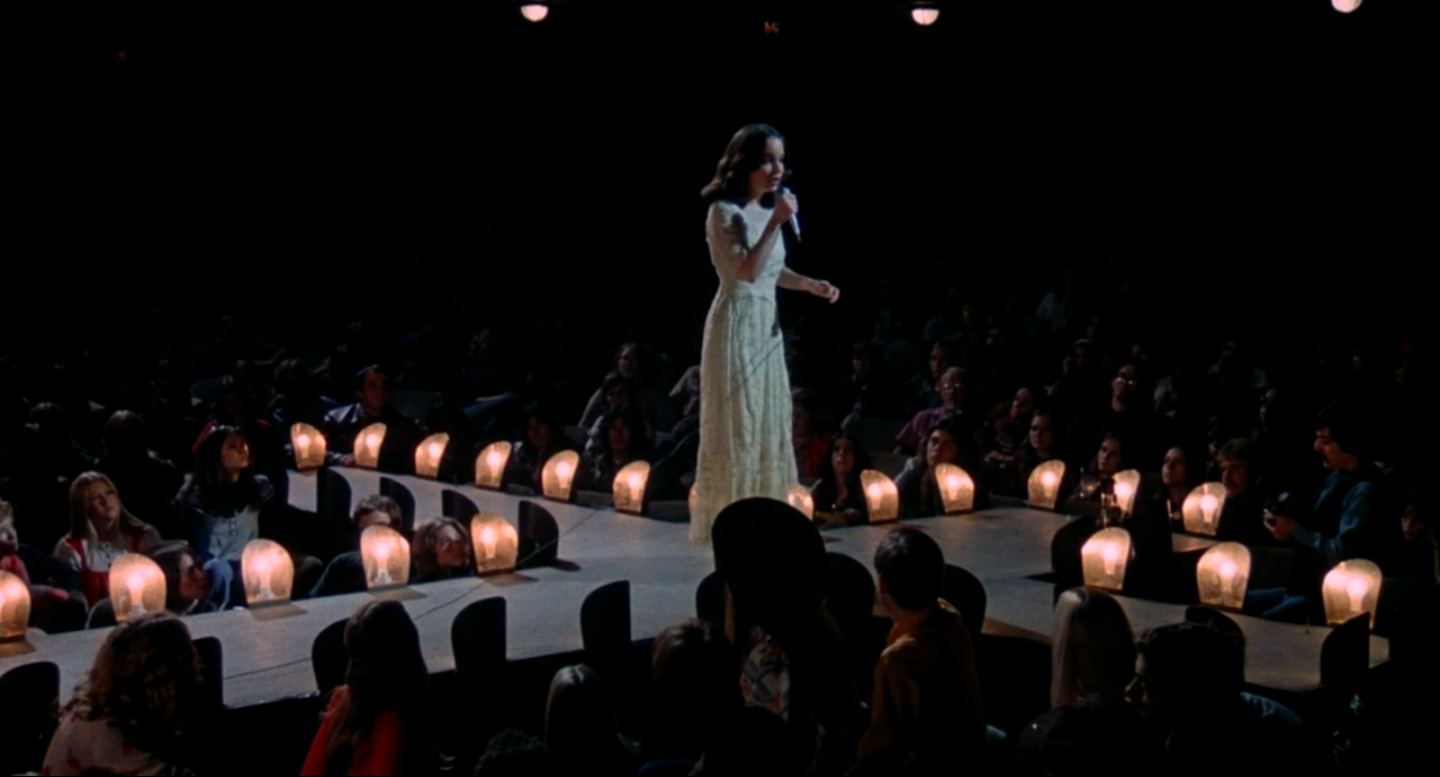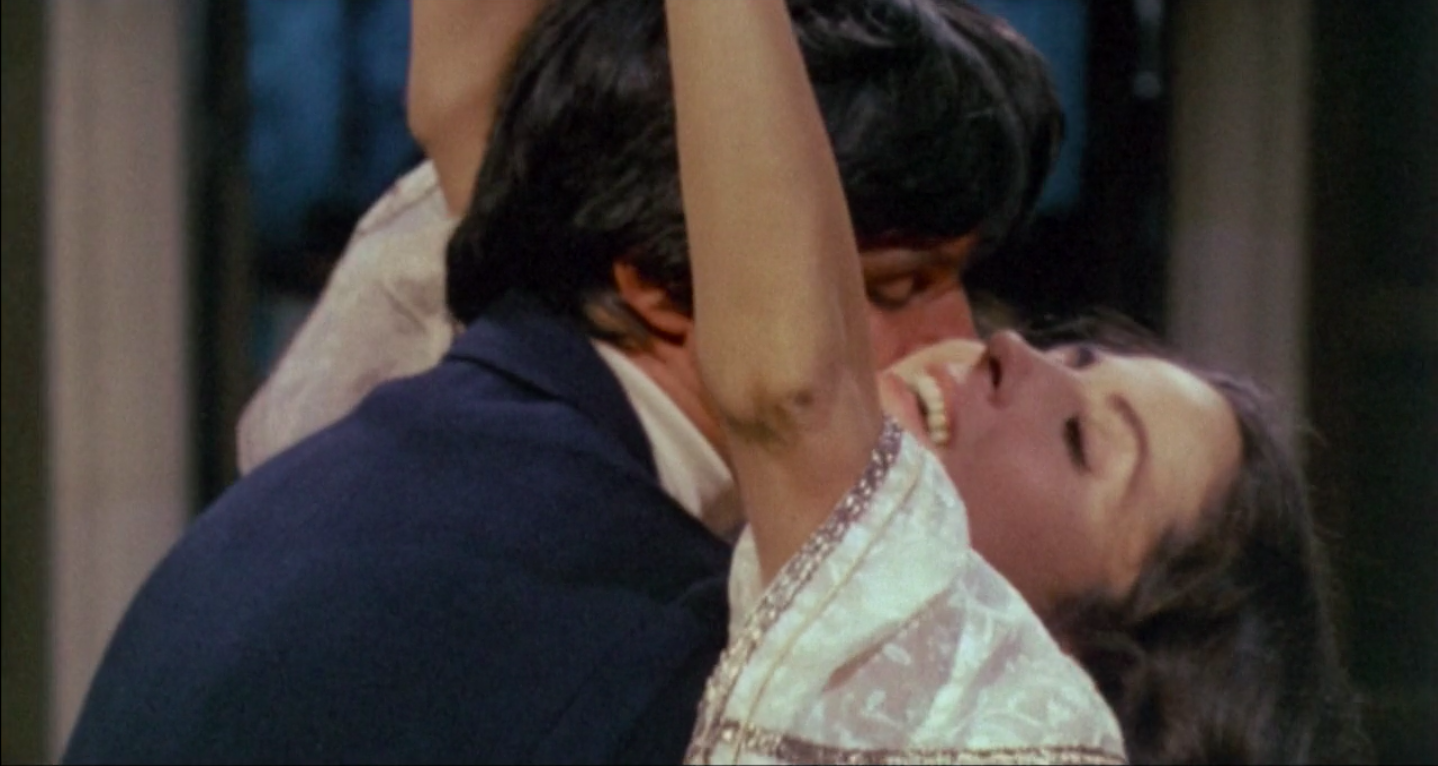Satanic Pacts | Mephisto Waltz & Phantom of the Paradise
Demonic bargains, cinematic pleasures.
Films discussed: Mephisto Waltz (1971) & Phantom of the Paradise (1974). Spoilers for both.
Content warning: death of a child, incestuous relationship, murder.
Pianist Myles Clarkson, played by Alan Alda, performs before a packed concert hall. The crowd is still, rapt. We see the crowd from the stage, and we see Myles from deep in the audience beyond rows of absorbed spectators. It’s a depiction of magnetism and power. He’s the whole show and a good one. But not everyone in the audience has the straightforward spectator-performer relationship with Myles that generally holds sway in the concert hall. The scene moves in on two audience members less spellbound than the rest. One is Jacqueline Bisset’s Paula, the other is Roxanne, played by Barbara Parkins. Their relationship with the performance is distinct because this is a satanic pact film, Myles is its central figure, Paula is beginning to unravel the dark conspiracy behind Myles’s virtuosity, and Roxanne is one of the key satanic conspirators.


The film is Paul Wendkos’s Mephisto Waltz (1971), a film about a dying pianist, Duncan Ely, who, with the assistance of his daughter (and lover) Roxanne, makes a pact with the devil to transplant his soul into the body of Myles Clarkson. Myles has “Rachmaninoff hands,” after all, so he’s a good pick. Paula, Myles wife, is left to suffer/enjoy the consequences, while trying to determine what’s actually happened to her husband. The film depicts a familiar kind of Faustian bargain. A deal with the Devil gets Duncan something impossible and delicious, but there are consequences—in this case, most notably, the death of Abby, Paula’s and Myles’s young daughter.
Part of the wave of post-Rosemary’s Baby satanic movies, Mephisto Waltz has none of the severity or dread of that film. Wendkos’s restless, assertive camera drinks in seventies-gothic opulence and a magnetic cast, approaching but never quite reaching camp, creating a weird, sexy kind of satanic story that—together with its focus on music and musicians—got me thinking about Brian De Palma’s Phantom of the Paradise, another film about music and a pact with the Devil.
De Palma’s Phantom of the Opera-inspired rock musical also channels Faust, and it features a demonic musical performance (among several) that rhymes with Myles’s triumphant piano concert. Phantom of the Paradise tells the story of songwriter Winslow Leach (William Finley) whose music is stolen by the demonic rock impresario Swan (Paul Williams) and who, when he seeks revenge at Swan's offices, becomes disfigured by a fall into a record press. He then dons a mask and becomes a Phantom of the Opera-type character, haunting Swan’s rock palace, though he’s ultimately convinced by Swan to work with him—on the condition that the music he writes will be performed by Phoenix (Jessica Harper), the object of his affection (and the “Christine” figure in this version of Phantom).
Phoenix has been the talented ingenue, coded as kindhearted and too good for the rock world, when she’s finally given a chance to perform solo at the Paradise (the Phantom, you see, has murdered the headliner). She sings alone, spotlit on stage and, later, on a catwalk. The crowd is still—caught entirely in her spell. If she had felt somehow apart from the world of the Paradise, now it's all hers. When the song ends, they leap to their feet in applause. The scene mirrors the performance in Mephisto Waltz not only in its depiction of triumphant performance, but also in how it cuts away to two figures with more at stake than the rest of the audience: we see the Phantom repeatedly, manning the spotlight, ecstatic at his music being performed by his chosen singer, and Swan just once, watching from a box during the applause, smiling at Phoenix’s success. The first image in the subsequent scene puts a cap on the performance: a note on a bouquet from Swan reading, “To my new star.”

Both films place this type of triumphant musical performance at the center of the satanic deal. Pacts with Satan need not center around music, but it certainly works well if they do. A Faustian bargain might ensure one’s place as an actor, businessman, or politician, but there’s something about virtuosity in music that comes close to resembling magic. The sublime musician has it all: she’s empowered, desired, loved. And, especially valuable in cinema, this can all be depicted in a single scene, the musician’s influence on the audience visible before our eyes and, perhaps, experienced by the viewer.
Musicians need the body—and bodily temptations are one of Satan’s key offerings. Musicians need their voices, their hands, their entire corporeal selves. Musicians also offer their audiences, aside from music, the visual pleasure in performance—the visual pleasure in looking at them. Both films recognize the bodily nature of musical success. They especially contemplate the limits of the human body—limits Satan can help overcome. Duncan Ely is a musical genius, but he has leukemia. Only by jumping into a new body—one with great hands—can he continue his life and his music. Winslow Leach’s problem arises from the rock milieu he’s trying to break into: his music is beautiful and exciting, but he is not. Thus Swan’s theft of his music—giving it first to the glam performer Beef and then, when the Phantom dispatches him, to Phoenix. Having a body is a drag. It gets old. It’s less pretty than you want it to be. It might just take the Devil or, at least, a demonic figure like Swan to solve the problem of its natural limits.
Dealing with the Devil is all about earthly desires—power and sex especially. When Phoenix has her star-making performance at the Paradise, she hasn’t yet made her deal—neither morally nor technically (she’s yet to sign Satan’s contract). It’s the effect of the performance on her that sets her down Satan’s path. The kindhearted ingenue is replaced as soon as the performance ends with someone distinctly more mercenary. “I'll do anything you want,” she tells Swan, “I owe you everything. Just give me that crowd again.” That same night, when the Phantom whisks her to the roof, the crowd’s cheers audible from the street below, she’s entirely unmoved by his warnings about Swan. “Don’t you hear them down there? Why should I give that up? . . . . I’ll give them whatever they want.” She’s immediately, character-alteringly drunk with the crowd’s adoration and her newfound power. She's receiving, finally, the things in this world she truly wants. By the time she’s asked to actually sign a contract, she does it without hesitation, laughing, her soul already gone.
When it comes to depicting power, both films incorporate the same insight. In the last act of Mephisto Waltz we see Paula reaching out to Satan. She kneels before a pentagram on the ground, disrobes, reads from a satanic book. We see, from her perspective, approaching feet visible in the crack below the door. As it swings open, we're back looking down on her, her eyes wide with awe. “Master,” she says, "I’m ready to bargain." We see Satan’s shadow, and we see the woman’s posture, demeanor, and reaction as she calls him, and as he enters—but we never see him. We know him, we feel his power, through her.
We might compare this to Swan’s introduction in Phantom of the Paradise. The film opens at a concert. The band finishes, and everyone looks up at a mirrored booth. We see gloved hands clap—rendering judgment—and the crowd follows suit. We hear Swan in this scene, but we don’t get a look at him. In fact, this dynamic—the world revolving around the unseen figure—continues until minute twenty, when he finally enters the frame as he prepares to enjoy a harem of musical hopefuls. Swan is best understood by the force of his power—by its effect on the people around him.
The effect on the people around satanic figures is also sexual. Swan is a rock god— thus the harem. And Phoenix, previously unwilling to subject herself to the casting couch, becomes open to Swan's advances as soon as she gets her first taste of musical success. In Mephisto Waltz, sex is the story’s crucial engine. The film opens with Paula rejected in bed by a sleepy Myles. Then, when Duncan transplants his soul into Myles’s body, things get distinctly better in the bedroom. Roxanne’s ex tells Paula, “[if you have sex with] one of them . . . nothing else will quite satisfy you." Satanists, perhaps unsurprisingly, know what they’re doing in bed.
Paula ultimately unravels the truth about her husband. Despite everything that’s happened to her and to her family, she doesn’t want her revenge; she wants her passion. Roxanne is Duncan’s true mate, and Paula makes her own deal with Satan to transplant her soul into Roxanne’s body. In the film’s closing shot, a moment of erotic excess worthy of De Palma—and recalling the passionate Jake-Gloria kiss in Body Double—we spin around Paula (in Roxanne’s body) and Duncan (in Myles’s body) as they envelope each other, kissing, in an outrageous, heated embrace.

Faust stories are typically tragedies. There’s a cost to the satanic feast. A pact with Satan is, classically, a rotten one. While Mephisto Waltz points to the moral cost of the satanic bargain (the aforementioned child’s murder being the price Duncan Ely pays to take Myles’s body) and Phantom of the Paradise focuses more on servitude (absurdly long, binding contracts recur), neither film conveys great depth of feeling with respect to this rottenness. Their stories have dark endings, but they're a lot of fun along the way. Mephisto Waltz does lace its gothic, opulent mis-en-scene—gilded mirrors, dripping candles, billowing curtains—with images of the perverse: sinister masks, incestuous kisses, distorted mirrors, gauzily blurred images, and, most strikingly, Roxanne leading a black dog, its head covered by a mask of a human head, through a wild party (where the human revelers are all wearing animal masks). And Phantom of the Paradise never lets viewers forget that they’re watching horror. In addition to its Phantom of the Opera setup, it piles on the classic horror references: a Frankenstein inspired stage performance, a German Expressionist stage set, a man walled in Cask of Amontillado-style, Swan’s Dorian Gray-inspired biography, and the Phantom’s rock cantata version of Faust. Both films signal the darkness and perversity at the core of their stories—the cost of doing business with Satan—but also want us to experience just how great a time it all is. Satanic pleasures may have their consequences, but we can revel in the pleasures all the same.
In Phantom of the Paradise, people die onstage—first Beef and later, in the film’s closing scene, Swan, his henchman Philbin, and the Phantom, all in the midst of the Swan-Phoenix concert-cum-wedding. In both scenes, the audience is energized by the spectacle, cheering and dancing along with the mayhem, though perhaps they are excused for not knowing, at the Paradise, what’s real and what’s part of the performance. The deaths do not impede the progress of the show but, instead, heighten its effect.
The ecstatic crowd at the Paradise inhabits something of the viewpoint presented by both films. The satanic pact sets the stage for a really good show—even if there are one or two onlookers, less absorbed than the rest, for whom the cost—the darkness—is plain.
Horror writing elsewhere:
Check out this piece by Audrey Fox in Crooked Marquee connecting the metatextuality of Scream and other nineties horror movies with the rise of a generation shaped by the video store.
Dead of Night has no publication schedule. Sign up to receive new essays about horror cinema in your email inbox.